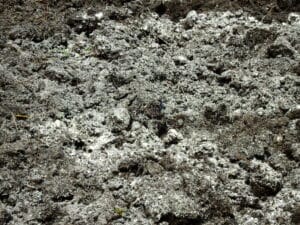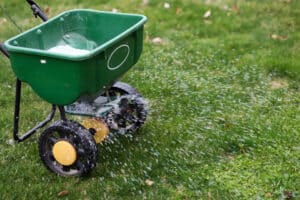Using synthetic herbicides can effectively kill clover, but they also pose risks to your lawn, ornamental plants, and the environment. Fortunately, there are natural methods to remove clover that are safer and just as effective. From manual removal to organic herbicides and soil improvements, these strategies can help you maintain a healthy, weed-free lawn. Additionally, we’ll recommend top lawn care services that can support long-term lawn health and prevent clover from returning.
Find Lawn Help
- See our list of top lawn care companies based on in-depth research.
- Select the company that best meets your needs.
- Get a free, no-obligation quote for your home.
Get a Quote From Lawn Professionals Near You
Compare quotes from local pros
Clicking “Get Your Estimate” submits your data to Home Service Quotes, which will process your data in accordance with the Home Service Quotes Privacy Policy.

Lime Soil Amendment

Lawn Fertilization
What’s Causing Clover in My Lawn?
There are multiple reasons you could have clover sprouting up in your lawn, most of which have to do with your soil. Clover can grow well in soil conditions where turfgrass struggles.
- Wrong Soil pH: The ideal soil pH—how alkaline or acidic the soil is—for most lawns is between 6.0 and 7.0. If your lawn’s soil is too acidic, it will be harder for grass to grow and much easier for clover. Luckily, you can use soil amendments like lime to balance out the pH.
- Poor Nitrogen Levels: Clover thrives in soil with low nitrogen levels. Grass needs nitrogen in the soil to grow well, while clover can obtain the nitrogen it needs from the air, effectively making its own fertilizer. Your soil may be low in nitrogen because you’ve used too much fast-acting fertilizer, which can ultimately lower your soil quality. Switching to organic fertilizer like manure or corn meal can help you avoid this.
- Compacted soil: Compacted soil prevents your grass from getting the nutrients—including nitrogen—air, and water it needs. Luckily, you can break up compaction with a core or spike aerator.
- Excessive Thatch Build-Up: Thatch is a layer of dead grass and organic material that accumulates between the soil and growing grass. While a thin layer is beneficial, too much thatch can create a barrier that prevents water and nutrients from reaching the soil, creating ideal conditions for clover. Regular dethatching or raking can help maintain a balanced lawn environment.
How To Get Rid of Clover Naturally
Here are the top ways to eliminate clover in your lawn without synthetic herbicides.



Pull It Out By Hand
You can remove small clovers manually. Gently loosen the soil with a spade and tug the clover out, roots and all. If you leave any roots behind, the clover will grow back.
Deprive It of Sunlight
You can kill clover by blocking sunlight from reaching it. Take plastic sheeting or an opaque garbage bag and place it over the patch, securing the corners with rocks to make sure it doesn’t fly up. This should get rid of the clover in a few weeks. Be mindful that this approach will also kill any grass or other plants under the plastic.
Spray a Vinegar Solution
While vinegar can kill weeds, there are some important things to be aware of when using it. First, the household vinegar you get at the grocery store (about 5% acetic acid) is unlikely to be effective. You’ll need to purchase concentrated vinegar (20%–30% acetic acid). At this strength, vinegar can cause skin and eye damage, so you should wear protective gear.
Second, vinegar is a non-selective herbicide. That means it may kill any plants it touches. Third, it may burn the leaves of the clover but leave the roots intact. However, if you’d like to use vinegar to kill clover, buy horticultural vinegar from a gardening store and follow the instructions on the label.
Apply an Organic Herbicide
Organic herbicides containing concentrated vinegar, sodium borate, or ammoniated soap may be effective against weeds like clover. Note that “organic” is not the same as “nontoxic”—something that kills plants is, by definition, toxic. Most of these herbicides are non-selective, and some may contaminate soil if not used properly.
Can You Prevent Clover in Your Lawn?
There are a number of ways you can prevent clover from growing in your lawn in the first place. You can use preemergent herbicides or these less-toxic methods.
Spread Organic Fertilizer
Using organic, slow-release, nitrogen-rich fertilizer will make your lawn less hospitable to clover. Some homeowners prefer traditional, fast-release synthetic fertilizer because it grows grass quickly and costs less. However, using organic fertilizer will lead to healthier growth in the long run. Common organic fertilizers include cow manure, guano, blood meal, bone meal, earthworm castings, and liquid kelp.
Use Corn Meal Gluten
Corn meal gluten releases organic peptides into your soil, preventing the clover’s growth. This won’t work on existing clover, but will prevent new seeds from sprouting—indiscriminately, so be careful not to use this method if you’ve recently reseeded your lawn.
Luckily, this measure won’t harm existing nearby grass. You can purchase corn gluten meal at your local garden store or online. You’ll need to time the application carefully with the weather, since the meal must be watered immediately after being applied, but then it needs several dry days in a row to work. You may also need to reapply after several weeks.
Mow Grass High
Clover grows best in grass less than 3 inches tall. Mowing too short stresses your grass, making it easier for clover to spread. Mowing your grass high gives it an advantage, allowing it to outcompete the clover for sunlight and water.
Are There Benefits To Having Clover in Your Lawn?
You may not like the look of clover, but it can actually benefit your lawn. In fact, some homeowners combine white clover seeds with cool-season turfgrass when seeding their lawn.
- Natural fertilizer: Clover’s symbiotic relationship with beneficial bacteria allows it to absorb nitrogen from the atmosphere and deposit it in the soil. Ultimately, clover can make your lawn greener and more lush.
- Weed prevention: Mowing your lawn high will prevent weeds, including clover. But if you like short, neat grass under 3 inches, letting clover flourish is a solid option. Clover’s leaves cast shade over the soil, making it hard for other weeds to take root and grow and compete with your grass.
- Lush appearance: Clover flourishes in conditions where turfgrass doesn’t, as it’s more tolerant of drought, soil compaction, and cold. Thus, it can keep your lawn looking green when turfgrass is struggling.
How to Maintain a Clover-Free Lawn Long-Term
Maintaining a clover-free lawn requires consistent care and attention to soil health, mowing practices, and fertilization. Here are some essential steps to keep your lawn free of clover and looking its best year-round:
- Keep Your Lawn Well-Fertilized: Clover thrives in nitrogen-deficient soil, so regular fertilization is key. Use a slow-release, nitrogen-rich organic fertilizer in the spring and fall to promote healthy grass growth and reduce the likelihood of clover taking hold.
- Mow at the Proper Height: Clover prefers shorter grass, so mowing your lawn to a height of at least 3 inches can give your grass a competitive advantage. Taller grass shades out weeds and prevents clover from spreading.
- Aerate and Dethatch Regularly: Compacted soil and excessive thatch can prevent your grass from getting the nutrients, air, and water it needs. Aerating your lawn annually and dethatching as needed will improve soil conditions and make it harder for clover to grow.
- Water Deeply but Infrequently: Frequent, shallow watering encourages weed growth, including clover. Instead, water your lawn deeply once or twice a week to strengthen grass roots, making them more resilient against invasive plants
- Overseed Your Lawn Annually: Bare patches in your lawn provide an open invitation for clover to take root. Overseeding with a high-quality grass seed in the fall will help thicken your lawn and reduce opportunities for weeds to grow.
- Remove Clover by Hand When Necessary: If you notice small patches of clover, pulling them out by hand before they spread can be an effective way to keep your lawn clear. Be sure to remove the entire root system to prevent regrowth.
By following these maintenance tips, you can create a healthy, lush lawn that naturally resists clover and other weeds. Regular lawn care and proper soil management will ensure your grass remains strong and vibrant throughout the seasons.
What Is the Best Professional Lawn Care Company?
TruGreen, our top choice for lawn care services, does not offer natural weed control, but the TruNatural Lawn Care Plan includes natural fertilization, which can keep clover from growing in the first place. The lawn care company also offers five different annual programs and a variety of à la carte services so that you can customize your lawn care for your lawn’s unique needs.
Frequently Asked Questions
What will kill clover but not grass?
Selective herbicides such as triclopyr can kill broadleaf weeds such as clover without harming grass. Unfortunately, most organic herbicides are nonselective and will kill turfgrass.
Should I get rid of clover in my lawn?
There are several reasons to keep clover in your lawn. Clover gathers nitrogen from the air and releases it into the soil. It often outcompetes other weeds, attracts pollinators, and keeps its green appearance in many conditions.
How do you control clover?
You can control fertilizer with proper fertilization, mowing high, applying corn gluten meal before it sprouts, hand-pulling it, depriving it of sunlight, or using a traditional herbicide.
Why is clover taking over my lawn?
Clover can take over your lawn in the right conditions: Low grass, the wrong soil pH, compacted soil, and poor nitrogen levels are excellent growing conditions for clover.





